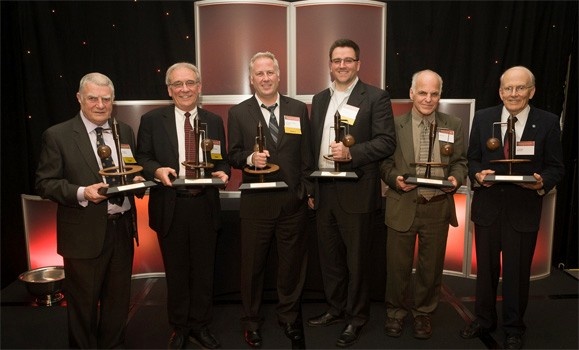¬È∂π¥´√Ω helped celebrate the 10th anniversary of the Discovery Centre‚Äôs annual fundraiser, the Discovery Awards, on November 15. With three awards and five nominations, Dal maintained its record of bringing home more awards than any other organization in Discovery Awards history.
¬È∂π¥´√Ω winners included Ron O‚ÄôDor as Professional of Distinction, Simon Sherry as Emerging Professional and Chris McMaster as recipient of the Innovation Award.
The annual event celebrating Nova Scotia’s brightest minds in science and technology is a reminder of the strong relationship between Dal and the Discovery Centre, two institutions sharing the goal of advancing science education and discovery.
Professional of Distinction ()
The Professional of Distinction Award celebrates a leading innovator and a role model for people who choose science as a career.
Dal Biology Professor Ron O’Dor won the award for his research on cephalopods, his administrative work at Dal and his high-profile scientific leadership roles.
is a big name in marine animal tracking, serving as senior scientist of the (CoML) and lead scientist for the . At the CoML, Dr. O’Dor coordinated 17 global projects worth over $650 million to compile information about the history and likely futures of marine species. At the Dal-headquartered Ocean Tracking Network, Dr. O’Dor guides and supports a network of scientists as they create a global system to monitor shifting animal migration patterns as climate changes.
“My colleagues and I have discovered all sorts of animals never seen before,” smiles Dr. O’Dor. “My favourite find was a seven-metre-long squid.”
Dr. O’Dor adds this Discovery Award to his list of accolades including his title of Canadian Geographic’s 2009 Environmental Scientist of the Year and his honourary degree from Lakehead University.
Emerging Professional ()
Simon Sherry, associate professor in the Department of Psychology and Neuroscience, took home the Emerging Professional of Distinction Award, which is presented to a person under the age of 35 who demonstrates intellectual achievements, excellence and potential for ongoing growth and development.
“Perfectionists often have tremendous difficulty in the face of perceived setbacks or failures,” explains Dr. Sherry. “They are often bothered by feelings of deficiency. Because of that, perfectionists are at risk for certain disorders.”
Dr. Sherry’s research has been supported by 12 grants over the past five years, totaling nearly $2 million. He has over 45 peer-reviewed papers and two book chapters and is recognized as a leading Canadian psychology researcher by the Canadian Psychological Association. Dr. Sherry also recently won an international award of excellence in research on personality.
Also nominated was Guy Drapeau, biomedical engineer and lead engineer with . Drapeau was instrumental in developing and bringing Thorasys’ tremoFlo Airwave Oscillatory System to market-ready status. With Drapeau’s leadership, Thorasys technology has improved treatment of conditions like asthma and chronic obstructive pulmonary disease.
“Spirometery is widely used to assess lung functions, restrictions and obstructions, but it is a difficult maneuver for children, the elderly and the sick to perform,” he explains. “With our technology, all the patient has to do is breathe normally through the device for a short period of time.”
Innovation Award ()
The Innovation Award applauds a representative of a company that has produced a commercially viable product or service and is ready to launch or has launched into the market.
It was won this year by Carnegie and Rockefeller Professor and Head of the Department Pharmacology Dr. Chris McMaster. He is co-director of Cheminformatics Drug Discovery Lab at the IWK Health Centre, and co-founder of – a Halifax-based biotechnology company.
Through his work with DeNovaMed, Dr. McMaster seeks to develop the first truly new class of antibiotics in the last thirty years. His first order of business is targeting the well-known MRSA superbug, which kills 50,000 people in North American and Europe alone per year.
“The Discovery Awards represent more than personal achievement,” says Dr. McMaster. “I’m grateful to the Discovery Centre for taking time to recognize the hard work and dedication that scientists bring to Nova Scotia. This award ceremony celebrates all those working to propel education, innovation and economic development in our province.”
Nominated in the category was Dal Computer Science Professor Srinivas (“Srini”) Sampalli, for the startup company he founded with grad students Musfiq Rahman, Pawan Khandavilli and Karthik Palanivelu.
The group’s device is called Alfred, and it started as an NSERC Engage project in collaboration with Sheedog Inc. Alfred will enable people to use their smartphone to conduct transactions. Paying for coffee will be as simple as opening the store’s mobile app and tapping the phone against the Alfred device.
"Imagine tagging all your credit cards, gift cards and coupons into one chip that resides on a smart phone,” says . “Imagine not having to carry around a full wallet. You're going to have a virtual butler; that's our product.”
Other awards
Kevin Hewitt, associate professor of Physics and Atmospheric Science, was nominated in the Science Champions category () as a tireless advocate of math and science education for youth of African Nova Scotian descent.
Among many other accomplishments, co-founded the (ILA) to increase the number of African Nova Scotians pursuing post-secondary education in the fields of science, technology, engineering and mathematics (a group of disciplines also known as “STEM”).
“I think you get youth interested in science by showing them how it applies to their everyday existence,” explains Dr. Hewitt. “It’s up to us to try and sustain that.”
One final Dal connection at the event: the Discovery Centre’s Hall of Fame inducted Sir J. William Dawson (1820-1899), one of Nova Scotia’s most famous scientists, and whose name the Dal graduate and undergraduate geology clubs proudly carry. Dawson discovered the remains of some of the oldest known reptiles, providing key evidence that birds, reptiles and mammals have common ancestry.

